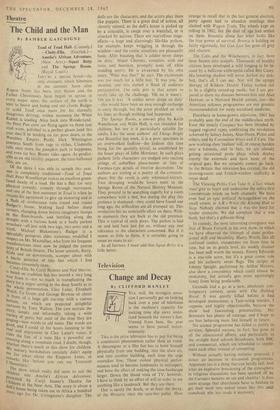Theatre
The Child and the Man
By BAMISER CASCO1GNE
THEY'RE a special breed—the . only creatures which hibernate in the summer. Soon after Regent Street has .burst into bloom and the Father Christmases have begun to sprout in every major store, the surface of the earth is Seen to heave and hump and out climbs Badger to scold Toad once more for his eternally dangerous driving; within moments the White Rabbit is leading Alice back into Wonderland; the Peter Pan crew are flying again on those taut steel wires, polished to a perfect gleam (and this Year they'll be -landing on ice, poor dears, at the Wembley Empire Pool); Dick Whittington Journeys South from rags to riches, Cinderella rolls once more the pumpkin path to happiness, and even fat boy Bainter rides again. As predict- able as an old fertility pageant. the time-hallowed rites are on.
Of the three I was able to sample this year. one is completely traditional—Toad of Toad Peter Woodthorpe makes an excellent green- faced dandy of a toad. He has a flair for very Physical comedy, comedy through movement, and one of the best moments in Toad is when he recants his agreement to give up motoring and in a flash of exuberance runs round and round Badger's house, braking hard before sharp corners, changing down before imaginary humps I n the floor-boards, and hurtling along the straight with a furious honk at a badly parked armchair—all just with two legs, two arms and a trunk. Michael Blakem ore's Badger is a sPiendidly pompous elder statemart, modelled I suspect on Mr. Macmillan, who from his frequent manifestations must now be judged the patron deity of British theatre. The lesser animals, Ratty, sole and on downwards, scamper about with L hectic pretence of tiny feet which I find uecomes tiresomely twee. . Ci"dY-Ella, by Caryl Brahms and Ned Sherrio, Is based on tradition but has moved a very long vvaY from it—not so much in transplanting the istorY (to a negro setting in the deep South) as in Whole presentation. Cleo Laine, Elizabeth yveleh, Cy Grant and George Browne sit about front of a huge gilt tea-tray with a canvas °°Itorn, on which are projected delightful crLoolls by Tony Walton. The cast narrate the svtosy. Simply . of and informally, taking a wide ariety parts, but most of the time they are Singing—new words to old tunes. The words are gee°d, and I could sit for hours listening to the s.asse and enjoyment in Cleo Laine's voice; it e'10°es the line of a tune like a powerful car ,4sting along a mountain road. 1 doubt, though, Ly'ether there's much in this show for children. flY nursery bookshelves certainly didn't equip 'nre for jokes about the Emperor Jones, or e dnarks like 'before you can say Toussaint Ouvesture.. niihe show which really did seem to suit the '-uudren was A inelia's African Adventure, 13,r,e.sented by Caryl Jen ner's Theatre for ZI:Iren at the New Arts. The story is about a . 3 house being taken out to Africa a hundred "r4rs ago for Dr. Livingstone's daughter. The dolls are the characters, and the actors play them like puppets. There is a great deal of action, all cleverly mimed, as the doll's house is picked up by a crocodile, is swept over a waterfall, or is attacked by natives. There are marvellous stage- effects—a huge and alarmingly life-like python, for example, keeps wriggling in through the window—and the comic situations are pleasantly basic. After boasting that 'a.soldier never sleeps on duty„' Major Chutney, complete with red tunic and bearskin, promptly nods off while standing sentry. He is awakened by his own snore. 'What was that?' he says. The excitement was too much for a little boy. 'It was you,' he shouted, and this started a flood of audience participation. The only pity is that actors so rarely take up the challenge. `Oh no it wasn't,' `Oh yes it was: 'A soldier never sleeps on duty' —this would have been an easy enough exchange to carry through. but the actor plodded on with his lines as though nothing had happened.
The Sponge Room, a one-act play by Keith Waterhouse and Willis Hall, is not intended for children, but nor is it particularly suitable for adults. Like the same authors' All Things Bright. and Beautiful last week, it is a poor specimen in an overworked fashion—the fashion this time being. for the quaintly trivial, as established by the lesser plays of John Mortimer. In such plays pathetic little characters are nudged into reciting strings of suburban place-names or lists of Formica-type details of interior decoration. The authors are aiming at a poetry of the common- place, but the result is only whimsical-literary. Two 'drooping would-be lovers meet in the Sponge Room of the Natural History Museum, They pretend to be searching eagerly for a room somewhere with a bed, but during the play this pretence is shattered—they could have found one long ago, the difficulties are all trumped up. This revelation has no noticeable effect on them. With- in moments they are back at the old pretence. This is typical of such plays. The pathos is laid on and laid bare just for us, without any real relevance to the characters concerned. But if it means so little to them, it is certainly going to mean no more to us.
In all fairness, I must add that Squat Betty is a little better.






























 Previous page
Previous page